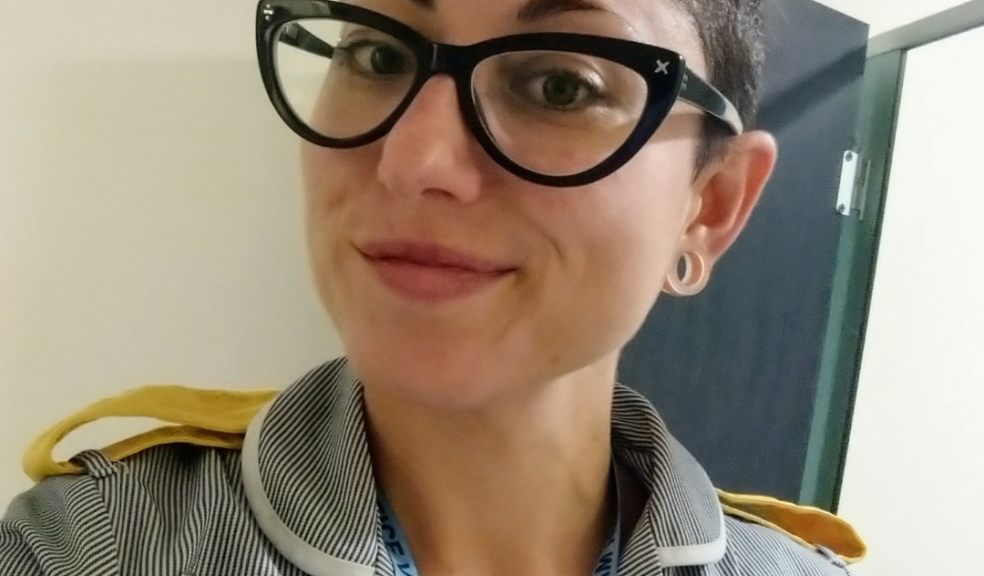
My life as a nursing student at the Exeter School of Nursing (University of Plymouth)
I decided to study nursing because I needed a change. I had an English degree under my belt, and had worked in journalism and advertising copywriting for years. I decided I wanted a more hands-on career, something where I could actually help people, instead of trying to sell them things. I began by working in care for several years, but this was unsatisfying and I always felt I could be doing more, especially in the field of end of life care, my passion. I literally woke up one day thinking, why don’t I try to become a nurse? The deadline for applications for the September 2018 cohort was quickly approaching, so I quickly studied what I needed to do and applied!
I chose Exeter because I live in Taunton, and it was the closest programme that I could attend. I had options in Yeovil and Bristol, but I love Exeter as well, so I liked the idea of spending more time there. The great thing is that while a student may attend class in Exeter, they can choose a clinical placement nearer to where they live, and choose the geographic area in which they do their placements, so your placement area can be more relevant to you. I like attending a satellite campus as I like the smaller cohort and more relaxed atmosphere, but with the expertise of instructors from the Plymouth of University.
When it comes to theory, I love being able to understand how the body works (or doesn’t), and understanding things on a cellular level such as why we get ill or how medications target certain symptoms. It can get complicated but once you understand the systems that keep us running and why things go wrong, I feel that it can really inform your practice.
It's not all about biology and theory however -- I love talking to people and understanding their situations and feelings. At my last placement, I was able to get out and do health promotion, offering health checks (blood pressure, BMI, blood glucose) to workers. Being able to talk to people about their health, diet, and lifestyle was surprisingly fun and rewarding, and these sometimes turned into discussions about mental health. Being able to listen well is a huge skill for nursing that needs to be practiced out in the field, and sometimes that ability to speak is just what the patient needs. If I can’t offer anything else to a patient, I can offer a listening ear.
Being a student nurse is a challenge and a joy. Recently I spoke to someone who said his wife was considering studying nursing. I asked him, “Do you love your wife? Do you ever want to see her again?” It was a joke, but one with a grain of truth. At times, it has taken all my resilience to balance this degree with family life, social life, work, and time to relax. But it has also been one of the most rewarding things I have ever done. It is that feeling when you leave a great shift at placement, where you felt you have applied your learning and gained new skills. That feeling when you get positive feedback from a patient about your attitude and aptitude. Or when you read a phrase like “respiratory ketoacidosis” or “proliferative retinopathy” and actually know what it means, when a year ago you would have been clueless.
They say to never decide what field you want to go into when you start your degree. I came into this course wanting to definitely, certainly, no argument, work in end of life care. But the wide variety of placements I have experienced has opened my eyes to how many options there are for nurses, and how many fields and specialties and locations I could go into. I still have a passion for end of life care, and my optional placement this year is in that field. But perhaps for now, I should just go back to the basics. I want to do something to help people.
Student Nurse Nicole Stanfield
Exeter School of Nursing (University of Plymouth)
The Exeter School of Nursing (University of Plymouth) is based at the WESC Foundation on Topsham Road in Exeter. It provides modern, high-quality facilities to ensure excellent delivery of health education and training. Purpose-built clinical skills laboratories, including home and ward settings, allow students to put their learning into practice in the most realistic surroundings possible. At present our exciting new pre-registration BSc and MNurs (Masters) Adult Health nursing and Mental Health nursing programmes can be studied here. For more information please visit the following webpage: https://www.plymouth.ac.uk/courses/undergraduate/bsc-nursing-adult-health/plymouth-university-exeter-school-of-nursing













